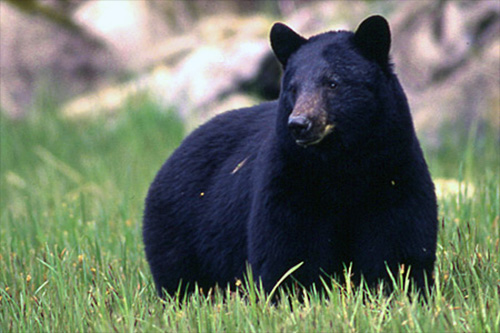
Alaska’s Board of Game last weekend unanimously decided against a proposal that would have tossed out a requirement for how resident black bear hunters process their kill. Almost every advisory committee in the state came down against the idea, arguing it could make it difficult to manage the population.
There’s a lot of information in a black bear skull, which is why almost every advisory committee in the region opposed a proposal to do away with a skull sealing requirement.
Sealing refers to the metal tags placed on parts of an animal — in this case, the skull of a black bear — which stay in place until the hide has been tanned and the skull boiled. Under the existing regulations, all hunters must seal a black bear skull within 30 days of the kill.
The new proposal would have scrapped that rule for resident hunters in game management units 1 through 4 — which is most of Southeast, excluding Juneau. The requirement would remain in place for nonresidents.
Roy Churchwell is a Juneau-area biologist for the state Department of Fish and Game. He told the board the current rule benefits research.
“For skulls in particular, we gather information from the skull including the size, we get a tooth to age the animal, and tissue for management and population monitoring,” he said. “Skull size is used to help monitor for changes in populations and potential overharvest — that would be expected if we observed a decrease in the average skull size harvested from an area.”
The proposal was authored by an Alaska resident, Mark Freshwaters, who said that it’s an undue burden on resident hunters and that enough information can be gathered from the sealed skulls taken by out-of-state hunters. The proposal also stated researchers can gather information from factors like the time and place of kill, and the sex of the animal.
“The regulation to require resident black bear hunters to have black bear skulls sealed should be eliminated,” the proposal reads. “This is an (an) unnecessary burden on resident hunters such as myself that live far away from a sealing officer. I live on a boat and cruise to remote southeast Alaska locations.”
But Churchwell said there’s a difference between the bears killed by resident and out-of-state hunters. Churchwell worries about the quality of data if the department were to base its research only on bear skulls from nonresidents.
“While this proposal suggests that we don’t need this information from resident hunters, non-resident and resident hunters have different motivations for harvesting bears and often harvest different size bears because of this,” he said.
Almost every Southeast advisory committee was against the idea. Michael Douville testified about several proposals on behalf of the Craig Advisory Committee.
“They felt valuable data is gathered that helps with management,” he said.
Fairbanks-based board member Al Barrette echoed the importance of the information.
“I believe that the data is very important in this part of the country to continue to keep collecting,” Barrette said.
Board chair Jerry Burnett guessed that the proposal came from not wanting to seal a part of the animal that wasn’t helpful to the hunter.
“I’m guessing that people don’t want to keep the skull,” he said. “They don’t want to salvage it. They’re hunting for meat only and there’s not a lot of meat on the skull.”
Board members discussed the proposal for around 10 minutes before they voted against it. The Board of Game meeting started on Friday in Ketchikan and concluded on Monday, a day early.
Raegan Miller is a Report for America corps member for KRBD. Your donation to match our RFA grant helps keep her writing stories like this one. Please consider making a tax-deductible contribution at KRBD.org/donate.





